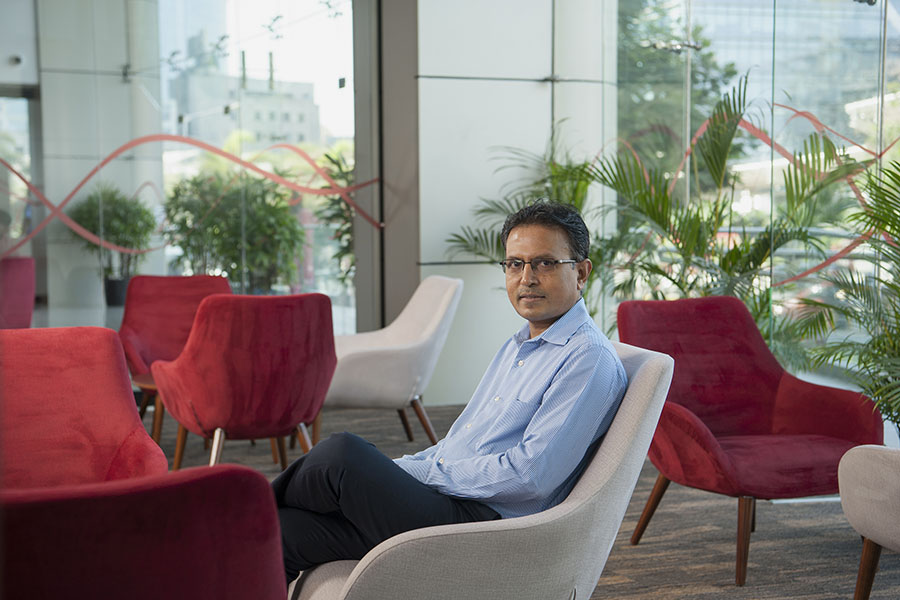'Invest in multiple tranches': AMFI's Nilesh Shah
In an interview with Forbes India, Nilesh Shah, chairman of the Association of Mutual Funds in India (Amfi) and Kotak AMC managing director, speaks about the broader performance of the sector, growth


 Nilesh Shah
Nilesh Shah
Image: Mexy XavierOne of the differences between previous financial crises and the current one is that this time more people are invested through mutual funds rather than direct stocks. Greater awareness also means that people have been resilient in continuing with their investments so far. In an interview with Forbes India, Nilesh Shah, chairman of the Association of Mutual Funds in India (Amfi) and Kotak AMC managing director, speaks about the broader performance of the sector, growth in the number of mutual fund investors and on investing in uncertain times. Edited excerpts:
Q. On creating wealth
Since the mid-90s we have seen the development of mutual fund products as well as the distribution base, and over the years we have gone through various ups and downs. But by and large we have enabled fantastic wealth creation for our investors. Today, we have more than nine crore folios, over 2.25 crore unique investors, and a pan-India presence. Obviously our equities in January 20 were looking far better than in May 20, but most of the fund houses have done tremendous alpha creation in terms of outperformance over benchmark indices.
Q. On investing in uncertain times
Our recommendation at any point of time has been to define your financial objective, have a good advisor and get a good plan. And then execute that plan with three guru mantras: Long term investment, regular investment and disciplined asset allocation. If you have a good financial plan, and follow the three mantras over a period of time, your financial objectives will be achieved.
Obviously at times like this your plan does get shaken up a bit. But time and again we have seen that these crises are an opportunity. On a market cap to GDP ratio, India is looking cheaper vis a vis the historical average. And if you invest at this point of time, whenever the market is in reversion you will be able to make money. But should you put all the money at one go because markets are trading at below historical averages? That’s not the right way to invest because markets are markets, they will be volatile and you never know how markets will behave in the days to come. So try to invest in multiple tranches, and be overweight in equity and gold. By doing multiple tranching, you will be able to average yourself into the market.
Q. On recent events in the fixed income category
Despite certain credit events that have occurred, by and large the mutual fund industry has done a done a fantastic job in managing fixed income. There have been challenges, but within those challenges we have improved the capital allocation process. We have been able to streamline market rates, our size is small, but many a times we have acted as a price setter with quick decision making. And, while there are certain credit events, if you see the overall non-performing asset (NPA) ratio of the mutual fund industry vis-a-vis banks or insurance companies, or other sectors like NBFCs (non-banking financial companies) or AIFs (alternative investment funds), we are at a much lower NPA.
Q. On improving corporate governance
Most of the large NPAs of the banking system have not been able to raise any money in the capital market.
They may have succeeded once, but thereafter they have never raised money. In fact, in a few cases, foreign portfolio investors have invested money in those companies, but Indian mutual funds by and large have stayed away.
So with money flow or capital, there has been a push on the promoter to improve governance.
Q. On MFs as a vehicle for financial inclusion
People associate mutual funds with rich people, but that’s no longer the case. When we started, we were more urban-centric and our distribution network was mainly in the top cities. Even today, we are still getting a bulk of our money from the top eight cities, but digital enabling has helped us reach out to every nook and corner of India. And we have seen tremendous growth in the number of investors in the last three to four years, compared to the previous 20 years. Distributors and other people have helped small investors like maids, drivers and other employees create retirement nests, providing an alternative to a money lender or a chit fund.
Recently, a domestic help sought a loan for a medical emergency and her employers, who had been doing SIPs (systematic investment plans) for her, told her she already had this money. She was pleasantly surprised because she never knew that her investment could deliver this kind of return. So even at the bottom of the pyramid, where they have very limited savings and don’t have access to formal financial investments, if you give them a financial saving, whether in an equity fund or a fixed income fund, they are able to build their nest.
Q. On MFs’ role in deepening the capital market
Clearly there was a bond market, equity market, derivatives market well before mutual funds came into play, but over a period of time mutual funds have exercised far more weight. Today, our equity markets have one of the highest volumes in terms of number of trades. We have a fairly sophisticated derivatives market and mutual funds have played a reasonable role in deepening the market and bringing it at par with global standards.
First Published: Jun 24, 2020, 11:51
Subscribe Now